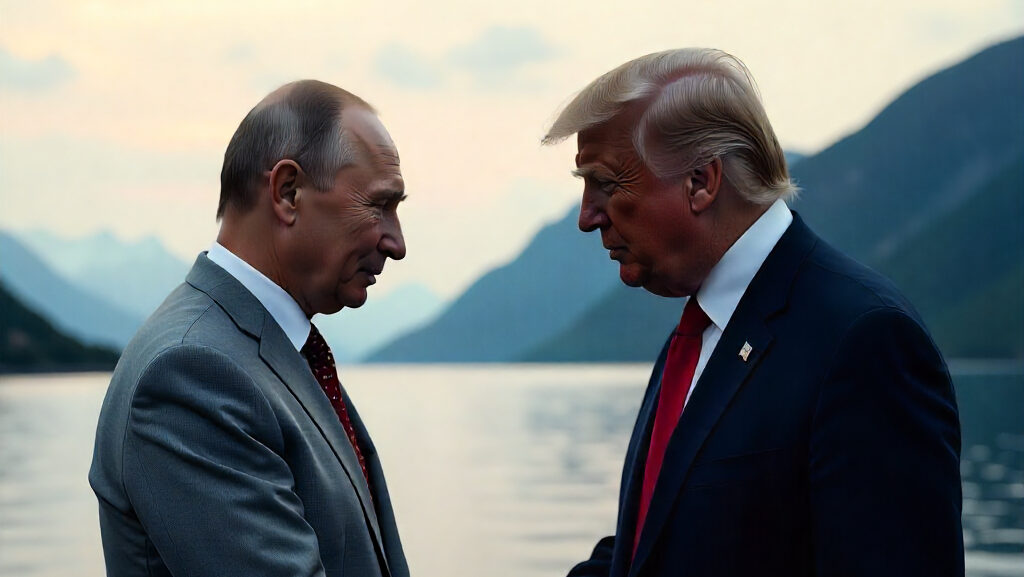Between the Yalta and Alaska Summits
Al-Bayan, UAE, August 21
Nearly six years after its outbreak, on May 8, 1945, World War II officially ended in Europe with the surrender of Nazi Germany, and then in Asia and across the world on September 2 of the same year with the surrender of Japan. Before the official end of the war, the Soviet city of Yalta hosted, from February 4 to 11, the most important Tripartite Conference, shaping the geopolitical order for decades to come based on the outcomes of this global conflict.
Eighty years after that pivotal meeting—attended by the leaders of the United States, the Soviet Union, and Britain—the American state of Alaska, just a few kilometers from Russian territory, became the stage for another historic encounter, this time between US President Donald Trump and Russian President Vladimir Putin. This meeting, unlike Yalta, was not about the aftermath of a war but rather about a war still raging: Russia’s brutal campaign in Ukraine, now in its fourth year, during which Moscow has seized nearly one-fifth of Ukrainian land and continues pressing forward.
For Europe, this war represents a profound violation of the rules established at Yalta eight decades ago and a harrowing sign that the continent’s geostrategic order is once again being rewritten. On one side stands the West, embodied by the European Union and NATO, with their economic, political, and military strength; on the other stands the Russian Federation, flexing its military power and wielding its political influence. It is almost cruel irony that the original blueprint of this East-West division was drawn in Yalta, a coastal city on the Black Sea in Crimea—territory that remained part of Ukraine until Russia seized and annexed it in 2014, decades after Soviet leader Nikita Khrushchev transferred it to Kyiv in 1954. The fact that the Alaska summit was convened to address the very conflict over Ukraine—and Russia’s steady annexations, beginning with Crimea, where Yalta itself sits—speaks volumes about history’s circular rhythm.
This holiday season, give to:
Truth and understanding
The Media Line's intrepid correspondents are in Israel, Gaza, Lebanon, Syria and Pakistan providing first-person reporting.
They all said they cover it.
We see it.
We report with just one agenda: the truth.


From the little that has been revealed, it is already clear that the first US-Russian summit under these volatile and perilous conditions will leave behind a legacy: a world order that departs significantly from the post-Yalta consensus. The Yalta Conference had produced the division of Germany, including Berlin, among the victors of World War II, as well as territorial adjustments in Poland. But its broader significance lay in the West’s tacit acceptance of Moscow’s dominance over Eastern and Central-Eastern Europe, and the incorporation of the Soviet Union—on its own terms—into the international framework represented by the United Nations and its institutions. The Alaska meeting, by many indications, mirrors this precedent.
It is widely believed that Trump and Putin reached an understanding to resolve the Ukrainian crisis along lines resembling Germany’s postwar division: ceding swathes of Ukrainian territory to Russian control, with official recognition not only from Ukraine’s government but also from its European partners. Alongside this, there appears to be an acceptance of Moscow’s demands to halt NATO’s expansion into neighboring states, especially Ukraine, in exchange for security guarantees designed to reassure Russia without undermining its grip on seized lands.
Such arrangements would lay down new strategic foundations for Europe, but foundations built on raw force, established by Russia’s military campaign rather than diplomacy. Just as striking, however, is the likelihood that Russia’s reintegration into the international system—politically, economically, commercially, and financially—will be the most immediate outcome of the Alaska summit. With the Trump administration’s active encouragement, Moscow is being pulled back into global structures of legitimacy, setting the stage for a reemergence of bipolarity in world affairs. The difference, however, is that today’s bipolar world will exist primarily in the strategic and military realms, while economically, China—and increasingly India—will continue to wield the greatest influence over the coming decades.
Diaa Rashwan (translated by Asaf Zilberfarb)

